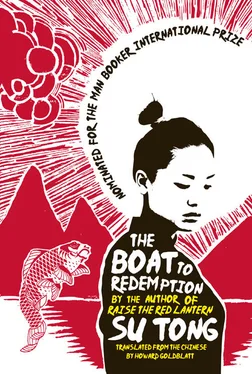At least I knew how to deal with an idiot. ‘Idiot,’ I said, ‘you’re the typical toad that wants to feast on a swan. What makes you think you’re worthy of being a martyr’s son? I’ll tell you something. The investigative team is coming soon, and they’ll announce that your father is a pig and your mother a duck, which means you were thumped into existence by a pig and a duck!’
He took after me with his duck whistle. He knew what ‘thumped’ meant, and cursed me angrily. ‘You’ve got a filthy mouth for someone so young. Thumped? Do you know how to thump? Well, I’ll show you. I’ll thump the shit out of you!’
We raced down the road, and I quickly left him in my dust. But even after I was well out of reach I kept running, something I hadn’t done in a long time. I ran like the wind. If I hadn’t been living on a barge, running would never have become one of life’s little pleasures. I ran until I was standing in front of Milltown’s red schoolhouse. No more wind — I was exhausted. I stood in the road, trying to catch my breath, and took a long look at the schoolhouse and playground. All of a sudden, I was struck by crippling sadness — I felt it in my belly and in my heart.
I’d spent only three months in the high-school section before leaving, and at the time I couldn’t have been happier. But now, with the passage of time and the change in my circumstances, I discovered that I missed school after all. I skirted the wall and walked up to my former classroom, where through the window I could see a roomful of boys and girls, their heads rising and falling like a field of sorghum stalks. A girl in a colourful jacket was sitting in my old seat. Her lips were moving, as if she were mumbling something. And she was picking her nose. They were repeating as best they could the foreign words their teacher was saying, but pretty much all that came out was a jumble of sounds, none of which I recognized. By standing on my tiptoes I could see the blackboard. They were learning English: NEVER FORGET CLASS STRUGGLE! was written in Chinese, and below that a line of English letters. After listening to them several times, I memorized the sounds: Ne-fu fu-gai-te ke-la-si si-que-ge. Was that how you said ‘Never forget class struggle’ in English? Without being aware of it, I was already translating the sounds into the local dialect, and a happy discovery nearly made me laugh out loud: in Milltown dialect and the secret language of the Sunnyside Fleet, the sentence meant something like ‘Go out and thump all you want.’
Thump. Go ahead and thump. That got me so excited I wrote the slogan on the wall with a piece of chalk I found on the ground. Below that I wanted to write my translation into the local dialect, but I couldn’t remember how to write one of the critical characters. So I wrote ‘Go out and thump’ instead. One missing character affected the whole thing. Then, in sudden inspiration, I erased the word ‘NEVER’, so that the slogan now read, ‘FORGET CLASS STRUGGLE.’ Just then a boy’s head poked out through the window. I didn’t know him, but he knew me. His eyes grew wide. ‘Ku Dongliang. What are you doing there?’
I threw down the chalk and ran off.
I was running again, but this time I was running away, and as I ran it dawned on me that since the slogan came from Chairman Mao, changing even one word made it a counter-revolutionary slogan. This was bad, very bad. I ran past the burlap-sack factory and headed towards Workers and Peasants Avenue. But when I reached the intersection, it occurred to me that my home was no longer on that street, so I turned and headed for the Government Affairs Building, which I knew like the back of my hand; my father had occupied an office on the fourth floor and my mother’s broadcasting studio was on the second floor. Not until I was standing in front of the building did it dawn on me that she too no longer worked there. I vaguely recalled Father telling me that she’d been transferred, but wasn’t sure if she’d been sent to the cooking-oil processing plant or the management office. So I went to inquire at the reception desk, where I saw a clutch of people standing around waiting for the day’s newspaper. I spotted several familiar faces, including some people who had been friendly to me in the past. But now they looked at me with blank faces. ‘What are you doing here, Dongliang?’ one woman asked. ‘Your mother no longer works at the broadcasting station.’
They told me she worked at the processing plant and described how to get there. It was far, nearly all the way to Maple Village, and it was getting dark by the time I got there, having walked the whole way. The milling machines had shut down for the day, but the smell of new rice and rapeseed oil hung in the air. Some workers, their shift over, gestured in my direction. I didn’t know them. ‘Is Qiao Limin here?’ I asked.
Mysterious grins appeared on their faces. ‘Yes, of course she is. She’s waiting for you.’
So I walked inside, where I saw three people in front of a milling machine, their eyes glued to me. One was my mother, the second was Teacher Jiang of the Milltown Middle School, and the third was a uniformed policewoman named Hong. I knew I was in big trouble and that it would have been smart to turn tail and run. But I was too tired to take another step.
My mother walked up — rushed me like a lioness, more like — and slapped me three times — smack, smack, smack. Then she turned to her companions and explained why. I still recall every word: ‘The first one was for him; the second for me, Qiao Limin, who’s tried to be an upstanding citizen all my life, only to give birth to a son who doesn’t know the meaning of the word “up-standing”; and the third was for his father, whose education of the boy has him writing counter-revolutionary slogans after only three months!’
AFTER ONLY a few days in Mother’s dormitory I was ready to head back.
I don’t know if it was her doing or the fact that I’d earned a bad reputation, but the other women in the dormitory steered clear of me. Their attitude influenced the men in the neighbouring tool-repair factory, who scowled if I was around. My only fan was a mangy dog that gave me a fervent welcome. It was begging to be liked. Day in and day out it hung around me, sniffing at my trouser legs and at my crotch — mainly at my crotch. I didn’t appreciate the mongrel’s attention, and was particularly annoyed by its fascination with my crotch. Even if I had felt more unwelcome than I did, I would still have been unwilling to make friends with a mangy cur. Finally I kicked it, and was surprised that the animal retained a measure of self-respect — it was a good thing I could run fast, or I’d have been bitten for sure.
The dog chased me all the way to Mother’s dorm, where it set up a howl that frightened the women inside. Knowing I was the one who’d set the dog off, Mother ran out with a wet mop and drove the barking dog off, then went back inside to tell the women that everything was fine. But someone must have said something unpleasant, because when I went up to her room, she wore a dark, gloomy expression. I plopped down on the bed and began scratching my feet — the wrong thing to do, given her mood. Still holding the wet mop, she turned on me, jabbing the mop at my legs one minute and my arms the next. ‘You wicked boy,’ she scolded. ‘You’re isolated from the masses, animals hate you, and a mangy dog chases you! Even a shit-eating dog has no forgiveness in its heart for you!’
I was clever enough to keep my mouth shut, and just let her rant on as I pinched my nose and held my breath. Go ahead, yell at me, I thought. Anything you say goes in one ear and out the other. It’s nothing but kongpi ! I sat down to dinner to a chorus of scolding, and for some reason the word ‘exile’ popped into my head. Maybe that’s what I was, an exile. But one thing I knew for sure was that Mother’s cramped dormitory was no home for me; it was just a way station. The words ‘mother’ and ‘son’ meant nothing here. I was a guest — and an unwelcome guest at that. Mother supplied me with three meals a day, but every grain of rice was saturated with her sadness, and every vegetable leaf was infused with her disappointment. If I lived with her like that, either she would die and I’d go crazy, or vice versa. And I wasn’t alone in feeling that way — she did too.
Читать дальше












